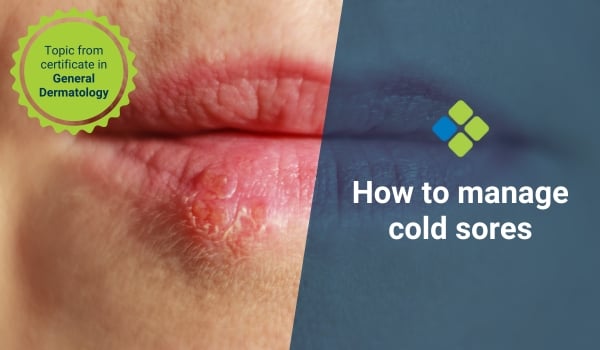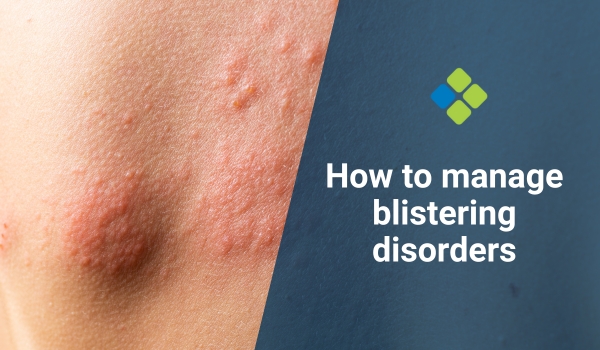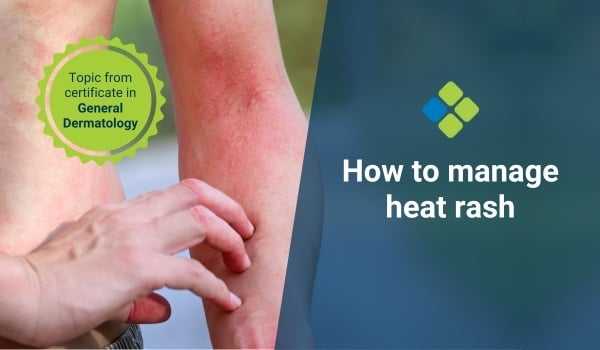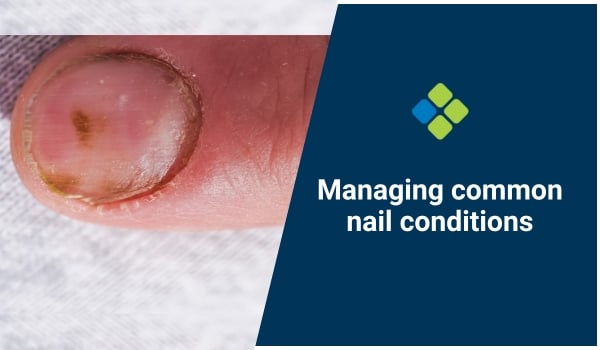How to manage cold sores
Read a simple GP guide to manage cold sores, including how to recognise symptoms, establish a diagnosis, educate patients, provide treatment and follow-up.

HealthCert Education
Cold sores, or fever blisters, are a common viral infection caused by the herpes simplex virus (HSV). Typically, they appear as small, fluid-filled blisters around the lips or mouth and can be quite uncomfortable for patients.
Primary care doctors need to know how to effectively manage cold sores in order to provide quality care to patients. In this article, we will explore a simple guide to help GPs navigate the management of cold sores.
How to recognise the symptoms of cold sores
Cold sores usually start with a tingling or burning sensation around the lips or mouth. This is followed by the appearance of small, fluid-filled blisters that may break open and crust over. Patients may also experience:
- Pain
- Itching, or
- Swelling in the affected area.
Diagnosis of cold sores
The diagnosis of cold sores is often based on the characteristic appearance of the blisters. However, if there is uncertainty, laboratory tests such as viral cultures or polymerase chain reaction (PCR) tests can confirm the presence of the herpes simplex virus.
The importance of educating patients
It’s important to educate patients about the nature of cold sores and how they can be transmitted. Cold sores are highly contagious and can be spread through close contact such as kissing or sharing utensils.
Patients should be advised to avoid direct contact with the sores and to practise good hygiene to prevent spreading the virus.
Treatment options for cold sores
While cold sores typically heal on their own within a few weeks, there are several treatment options available to help alleviate symptoms and speed up the healing process.
Antiviral medications
Oral antiviral medications, such as acyclovir, valacyclovir, or famciclovir, can help reduce the severity and duration of cold sores when taken early in the outbreak.
Topical treatments
Over-the-counter creams or ointments containing docosanol or benzocaine may provide relief from pain and itching.
Topical moisturisers
Applying a moisturising balm or lip balm can help prevent the lips from becoming dry and cracked, which may exacerbate cold sore symptoms.
Pain relief
Patients can also use over-the-counter pain relievers, such as ibuprofen or acetaminophen, to alleviate discomfort.
Managing recurrences
Cold sores can recur intermittently, especially during times of stress, illness, or sun exposure. Encourage patients to identify and avoid triggers that may precipitate outbreaks. Long-term suppressive therapy with oral antiviral medications may be considered for patients who experience frequent or severe recurrences.
Follow-up and monitoring
It is vital to schedule follow-up appointments with patients to monitor their progress and adjust treatment as needed. Doctors should reinforce the importance of adherence to treatment regimens and preventive measures.
Referral to dermatologist
While primary care doctors can effectively manage most cases of cold sores, there may be instances where referral to a dermatologist is necessary. This includes:
- Cases of severe or recurrent outbreaks,
- Atypical presentations, or
- Complications (e.g. secondary bacterial infections).
By familiarising yourself with the management of cold sores and through additional education in general dermatology, primary care doctors can better serve patients and provide them with relief. With a knowledgeable and empathic approach to treatment and follow ups, GPs can help patients manage this common dermatological condition effectively.
– Dr Rosmy De Barros
For further information on this topic, you may be interested to learn more about the HealthCert online Professional Diploma program in General Dermatology.
Engaging with this blog can help meet your annual
|

How to claim your CPD hoursIf you consume educational webinars, podcasts, articles, or research on this blog, you can Quick Log CPD hours with the RACGP via the usual self-submission process. You will be asked to reflect on what you have learned, and you will require supporting evidence such as a screenshot.Download the RACGP’s guide to self-recording your CPD here. |
Read another article like this one: How to manage lupus in primary care

 1800 867 1390
1800 867 1390






